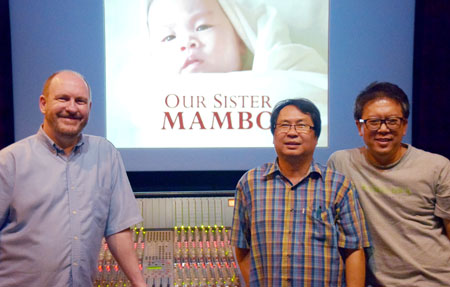CEDAR is the system of choice at Ramindra Sound Recording Studios in Bangkok

Gordon Reid (CEDAR Audio), Yongyut Kurmod (CDA Pro-Audio), and Sunit Asvinikul (Ramindra Sound Recording Studios)
18 November 2015
From Pro Audio Asia Magazine, November/December 2015
Founded in Bangkok in 1971 by Mr Pong Asvinikul, Ramindra Sound Recording Studios started out as a small studio that recorded dialogue, music and effects for Thai films. The studio later expanded into foreign markets as well as developing its services for the Thai industry, and has been winning Thai film awards almost every year for the past two decades. In 1994, it was the first studio in Thailand to receive a licence to mix sounds in Dolby Stereo (SR) and, the following year, was licensed to mix in Dolby Digital (SR-D). Then, in 2003, Ramindra was the first studio in Thailand to install a Dolby Digital Master Unit (DMU). With current services ranging from optical transfers to re-recording, audio post and Dolby Digital Sound Mixing, it is one of Thailand's leading post-production houses, and you can now walk into their unassuming premises in Bangkok to find a large Dolby Atmos soundstage in their main studio.
"We work on a wide range of films from Thailand, China, and further afield", explained Mr Pong's son, Mr. Sunit Asvinikul, now the company's CEO and still an active mix engineer. "Many of these have noise problems, so in the past we've tried using the low-cost audio plug-ins that claim to remove noise but leave the sound unaffected. But while the picture remained unaffected" he laughed, "the sound was not the same".
Having sought other solutions, the studios tried a CEDAR DNS2000 dialogue noise suppressor. "This was a 2-channel hardware unit design specifically to work with Pro Tools", explains CEDAR Audio's Managing Director Gordon Reid, who visited Ramindra earlier in June following the Broadcast Asia 2015 conference in Singapore. "We introduced it in 2004 when CPU power was still very much at a premium and, being a dedicated hardware unit, it took all of the processing load away from the host system. It was also the first version of DNS with automation, so it was quickly adopted worldwide for cleaning up dialogue in Pro Tools equipped post studios as well as for final mixing."
"We still use the DNS2000 today", continued Mr Asvinikul. "But more and more in recent years we've needed a multi-channel tool and, while running multiple passes using the 2-channel unit worked, it wasn't ideal for us. Again, we tried the alleged alternatives, but when we were approached last year by one of our customers in Singapore to clean the Mandarin language soundtrack for the movie Our Sister Mambo, their people asked us specifically to use CEDAR, and this gave us the push we needed to try CEDAR Studio."
"At that time, CEDAR Studio 6 had just appeared, so Mr Yongyut Kurmod of CEDAR's dealer in Thailand, CDA Pro-Audio (Siam) arranged a trial for us. Installing the software was very simple, and as soon as we started to test it, it was clear that this was the tool we needed. So we purchased the full CEDAR Studio suite and we now use it every day on every movie. Most of the problems we encounter are caused by background noise behind the dialogue, for which the latest version of the DNS One dialogue noise suppressor is ideal, but many soundtracks suffer from clipping distortion and other broadband noises, so we also use Declip and Auto Dehiss quite frequently, although all of the processes in CEDAR Studio are needed from time to time."
"Earlier this year, we upgraded to CEDAR Studio 7. Installation was again straightforward, and we are now running this on our newer Pro Tools 11 systems. However, because CEDAR Studio 7 is 64-bit, CEDAR allowed us to keep CEDAR Studio 6 installed on our 32-bit Pro Tools 10 systems. This means that, just by moving the dongle between the various systems, we can use whichever is needed for any given job."
"Today, we're working in Dolby Atmos for Thai films, and it's a real benefit being able to use a large number of simultaneous instances of DNS One in a multi-channel environment. Although the software runs on the host system, the processing power needed for each instance is remarkably small and CEDAR is still the only system we know that doesn't damage the dialogue sound. We prefer to use it to anything else. It runs without problems, and it's very easy to get the right result, which saves us valuable time."
Gordon Reid concludes, "It's not widely known, but CEDAR's presence in Thailand stretches back to the 1990s, when we first supplied our Series 2 and Series X restoration modules to archives in and around Bangkok. We have been supplying the film and broadcast markets with both hardware and software solutions ever since, and Ramindra Sound Studios was the first post-production studio that I visited with Mr Yongyut after appointing CDA Pro Audio as our dealer for Thailand. I was therefore delighted when I heard that they are now using CEDAR Studio on a daily basis. I was also flattered to have one of the country's leading studios speak so warmly about CEDAR. I understand that they are now building a new, larger studio for film mixing for the Chinese market, and I look forward to visiting this when I return to Bangkok later this year."
For further information:
CEDAR Audio Limited, 20 Home End, Fulbourn, Cambridge, CB21 5BS, United Kingdom.
t: +44 1223 881771
f: +44 1223 881778
e: info@cedaraudio.com
CDA pro-Audio Siam
w: www.cda-proaudio.com
Ramindra Sound Recording Studios
w: www.ramindra.com